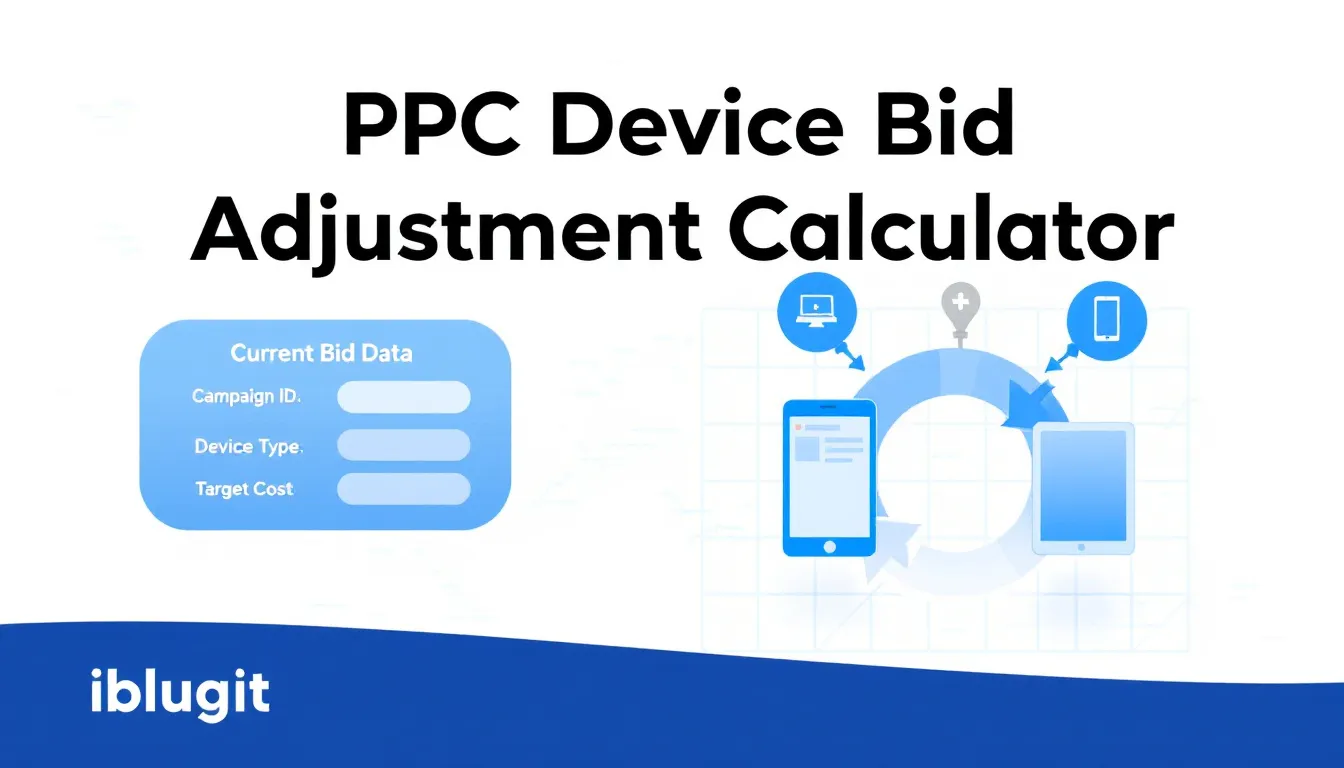Is this tool helpful?
How to Use the Device-Based PPC Bid Adjustment Calculator Effectively
This calculator helps you optimize paid search campaigns by adjusting bids based on device performance. Follow these steps for accurate results:
- Current Bid Data: Enter your existing CPC bids for each device type. For example:
- Desktop: $2.00 CPC
- Mobile: $1.70 CPC
- Tablet: $1.80 CPC
- Performance Metrics: Provide click-through rates (CTR) and conversion rates for each device. For example:
- Desktop: 7.0% CTR, 3.5% Conversion Rate
- Mobile: 6.0% CTR, 2.9% Conversion Rate
- Tablet: 6.5% CTR, 3.1% Conversion Rate
- Preferred Device (Optional): Select the device type you want to focus on for your campaign enhancement.
- Maximum Bid Adjustment Percentage (Optional): Set the highest percentage change allowed when adjusting bids, for example, 25%.
What Is the Device-Based PPC Bid Adjustment Calculator and Why Use It?
The Device-Based PPC Bid Adjustment Calculator helps you make data-driven decisions to optimize your paid search campaigns across desktop, mobile, and tablet devices. It analyzes your current bids, CTR, and conversion rates and recommends bid adjustments that improve efficiency, reduce wasted spend, and boost your overall return on investment (ROI).
By leveraging device-specific performance insights, you avoid uniform bidding mistakes and ensure your budget targets the most profitable channels. This strategic approach maximizes conversions and helps you better allocate your ad spend across devices.
Key Benefits of Using This Bid Adjustment Tool
- Make informed bid changes based on actual device performance
- Improve campaign success by targeting high-converting devices
- Spend your ad budget more efficiently across devices
- Increase ROI through smart, device-specific bidding
- Save time by automating complex bid calculations
- Reduce risks of overbidding or underbidding on devices
How the Calculator Determines Optimal Bid Adjustments
The calculator compares performance metrics for each device against a baseline to suggest proportional bid changes. It uses a straightforward formula:
Using MathJax 3 format for clarity:
$$BidAdjustment = \frac{DeviceConvRate \times DeviceCTR}{BaselineConvRate \times BaselineCTR} – 1$$
This formula measures how each device’s conversion rate and CTR stack up against the baseline device’s performance, producing a positive or negative adjustment percentage. Positive values indicate devices worth increasing bids on, while negative values suggest lowering bids.
Real-World Usage Examples of This PPC Bid Adjustment Tool
Example 1: Online Retail Campaign
An online retailer tracks the following data:
- Desktop: $1.90 CPC, 6.8% CTR, 4.0% Conversion Rate
- Mobile: $1.60 CPC, 5.7% CTR, 2.7% Conversion Rate
- Tablet: $1.75 CPC, 6.2% CTR, 3.5% Conversion Rate
The calculator suggests:
- Desktop: +12% bid adjustment
- Mobile: -15% bid adjustment
- Tablet: +4% bid adjustment
Example 2: B2B Software Service Campaign
A B2B company with these performance stats:
- Desktop: $4.00 CPC, 5.0% CTR, 4.8% Conversion Rate
- Mobile: $3.00 CPC, 3.8% CTR, 2.5% Conversion Rate
- Tablet: $3.50 CPC, 4.3% CTR, 4.1% Conversion Rate
Recommended bid changes include:
- Desktop: +22% bid adjustment
- Mobile: -18% bid adjustment
- Tablet: +8% bid adjustment
Strategies to Implement Device Bid Adjustments Successfully
Start Gradually
- Apply small bid changes initially (5-10%)
- Observe performance over 2-3 weeks
- Adjust bids further based on new data
- Record all changes and results for ongoing optimization
Monitor Key Performance Indicators
- Cost per conversion by device
- Return on ad spend (ROAS)
- CTR trends across devices
- Conversion rates per device
- Average ad position in search results
Additional Tips for Managing Device-Specific PPC Bids
Review Device Bid Adjustments Regularly
Adjust device bids every 2-4 weeks based on new performance data. Larger campaigns with high daily budgets may require more frequent updates.
Match Bidding with Your Campaign Goals
If device performance is similar, uniform bids across devices may suffice. The calculator helps you identify when targeted adjustments improve results.
Account for Seasonal and Audience Shifts
Device usage changes seasonally. Adjust bids before key sales periods or events to align with evolving user behaviors.
Separate Brand vs. Non-Brand Campaigns
Analyze and adjust bids independently for brand and non-brand campaigns to reflect their unique performance patterns across devices.
Best Practices for Device-Based PPC Bid Optimization
Collect Reliable Data
- Ensure sufficient data volume for statistical accuracy
- Use accurate tracking tools to capture device-specific performance
- Maintain historical records to compare trends over time
Consider Industry and Audience Behavior
- Account for device preferences common in your industry
- Tailor bids to how your target audience engages by device
- Analyze competitor bidding intensity per device
- Evaluate landing page experiences across devices to maximize conversions
Important Disclaimer
The calculations, results, and content provided by our tools are not guaranteed to be accurate, complete, or reliable. Users are responsible for verifying and interpreting the results. Our content and tools may contain errors, biases, or inconsistencies. Do not enter personal data, sensitive information, or personally identifiable information in our web forms or tools. Such data entry violates our terms of service and may result in unauthorized disclosure to third parties. We reserve the right to save inputs and outputs from our tools for the purposes of error debugging, bias identification, and performance improvement. External companies providing AI models used in our tools may also save and process data in accordance with their own policies. By using our tools, you consent to this data collection and processing. We reserve the right to limit the usage of our tools based on current usability factors.







